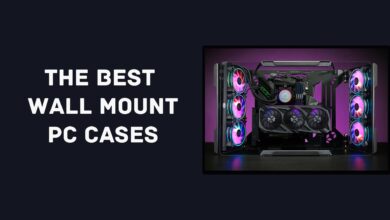Best Water Cooling Cases For High-End Builds
One of the most efficient and fun methods for cooling your PC components is to use a custom loop water cooling system. Having said that, getting your hands on the best water cooling cases is not exactly an easy feat.
As powerful CPUs and GPUs have been more widely available over the past few years, it has become increasingly popular for PC hardware enthusiasts to integrate their computer components inside of a custom water cooling loop.
Not only does a bespoke water-cooling loop provide effective cooling performance, but it also transforms your personal computer into an attractive display masterpiece at the same time.
Even if it is feasible to implement water cooling in budget PC cases, we want to make sure that you are aware of all of your alternatives. PC cases that are designed to accommodate water cooling typically perform more effectively than their counterparts. The following are, in our opinion, the best PC cases available in 2023 for using water-cooling components.
Let’s get started!
The Best Water Cooling Cases – Our Choices
| # | Preview | Product Name | Award | Details |
|---|---|---|---|---|
| 1 | 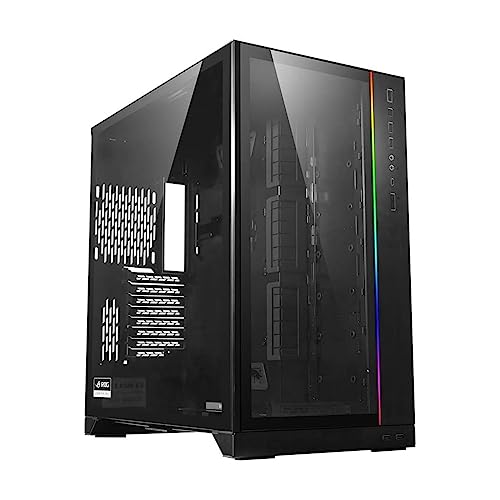 | LianLi O11 Dynamic XL | Best Overall Water Cooling Case | Check Price |
| 2 | 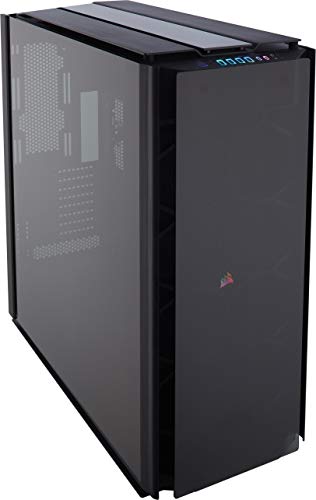 | Corsair Obsidian 1000D | Best Premium Water Cooling Case | Check Price |
| 3 | 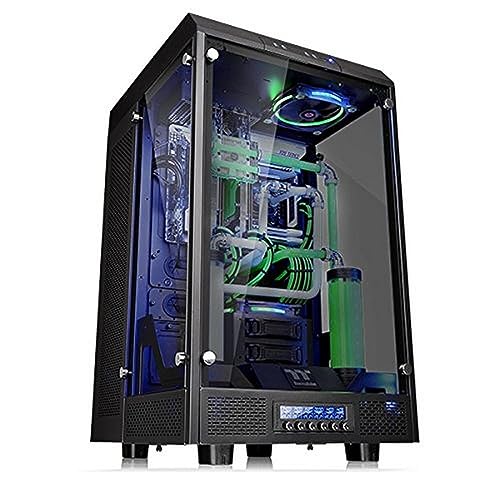 | Thermaltake Tower 900 | Best Showcase Water Cooling Case | Check Price |
| 4 |  | Cooler Master Cosmos C700M | Best RGB Water Cooling Case | Check Price |
| 5 | 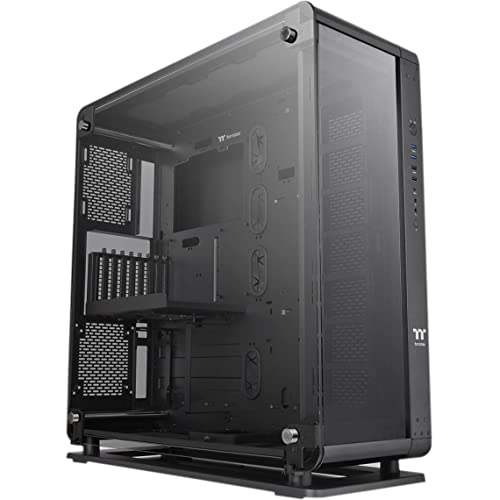 | Thermaltake Core P8 | Best Stealthy Water Cooling Case | Check Price |
| 6 | 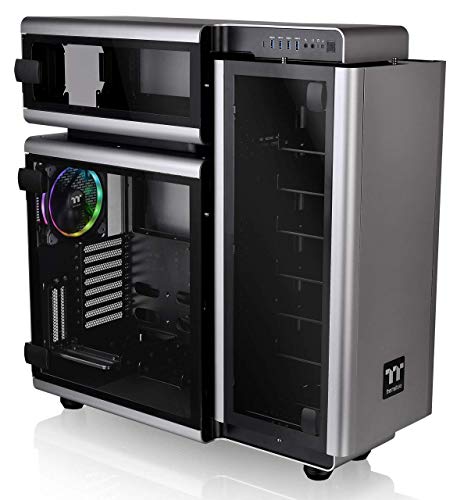 | Thermaltake Level 20 | Best Designed Water Cooling Case | Check Price |
| 7 | 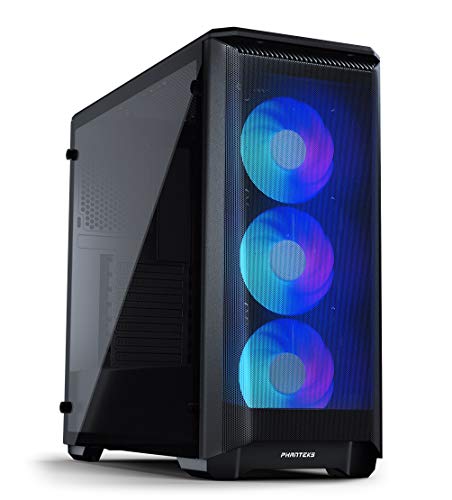 | Phanteks Eclipse P400A | Best Compact Water Cooling Case | Check Price |
| # | 1 |
| Preview |  |
| Product Name | LianLi O11 Dynamic XL |
| Award | Best Overall Water Cooling Case |
| Details | Check Price |
| # | 2 |
| Preview |  |
| Product Name | Corsair Obsidian 1000D |
| Award | Best Premium Water Cooling Case |
| Details | Check Price |
| # | 3 |
| Preview |  |
| Product Name | Thermaltake Tower 900 |
| Award | Best Showcase Water Cooling Case |
| Details | Check Price |
| # | 4 |
| Preview |  |
| Product Name | Cooler Master Cosmos C700M |
| Award | Best RGB Water Cooling Case |
| Details | Check Price |
| # | 5 |
| Preview |  |
| Product Name | Thermaltake Core P8 |
| Award | Best Stealthy Water Cooling Case |
| Details | Check Price |
| # | 6 |
| Preview |  |
| Product Name | Thermaltake Level 20 |
| Award | Best Designed Water Cooling Case |
| Details | Check Price |
| # | 7 |
| Preview |  |
| Product Name | Phanteks Eclipse P400A |
| Award | Best Compact Water Cooling Case |
| Details | Check Price |
Last Update on 2026-03-03 at 12:53 / Affiliate links / Images from Amazon Product Advertising API
Why you should trust us
At appuals.com, we love to test out PC cases. Our highly enthusiastic team is well-versed in the intricacies of PC cases and we look forward to upcoming innovations in this field. We’ve been doing these reviews for a long time, and it shows in how thorough and insightful they are. Hassam Nasir, our resident PC hardware guru, has been writing case reviews since the time of side-panel case fans.
You might say that he enjoys delving into the finer points of PC hardware, such as airflow testing, thermal evaluation, acoustic testing, cooling potentials of AIOs, and so on. Since he has been fixated on PC technology since the days of the Antec Lanboy, his knowledge should come as no surprise.
In spite of this, we don’t only depend on our past knowledge; we test each PC case thoroughly before reporting about it. We check for issues with airflow, thermal competence, and acoustic profiles among other aspects. Quality and durability testing of cases is where our team really shines. When writing our reviews, we always keep the user’s perspective in mind. We can help you in your search for a suitable PC case, whether you require a cheap alternative or the best one available.
1. LianLi O11 Dynamic XL
Best Overall Water Cooling Case
Pros
- Impressive Tempered Glass Design
- Loads of Internal Space
- Tons of Fan Mounting Options
- Superb Build Quality
Cons
- Unconventional PSU Layout
Form Factor: Full-Tower | Dimensions: 471 x 285 x 513 mm | Radiator Support: 120mm, 140mm, 240mm, 280mm, 360mm | Front Panel: 4x USB 3.0, 1x USB 3.1 type-C, 1x HD audio | Motherboard Support: E-ATX, ATX, Micro-ATX, mini-ITX
The Lian Li O11 Dynamic XL is not only one of the finest cases that can be purchased right now, but it also tops our list as the best overall water cooling case. The O11 Dynamic series has become a best-seller among PC builders and has gained legendary status in the industry as a result of its forward-thinking design, cutting-edge features, and spacious interior.
The computer case was designed in collaboration with “Derbauer,” better known as “der8auer” in online overclocking communities. He has ensured that the case is suitable for high-performance computer components and that it is compatible with rigs that have been customized with water cooling.
As a complete tower chassis, the O11 Dynamic XL measures 471 x 285 x 513 mm and tips the scales at 11.6 kg. You may use any consumer desktop motherboard with this PC case because it is compatible with E-ATX, ATX, mini-ITX, and micro ATX. However, for the sake of aesthetics, we recommend not using a motherboard smaller than a standard ATX.
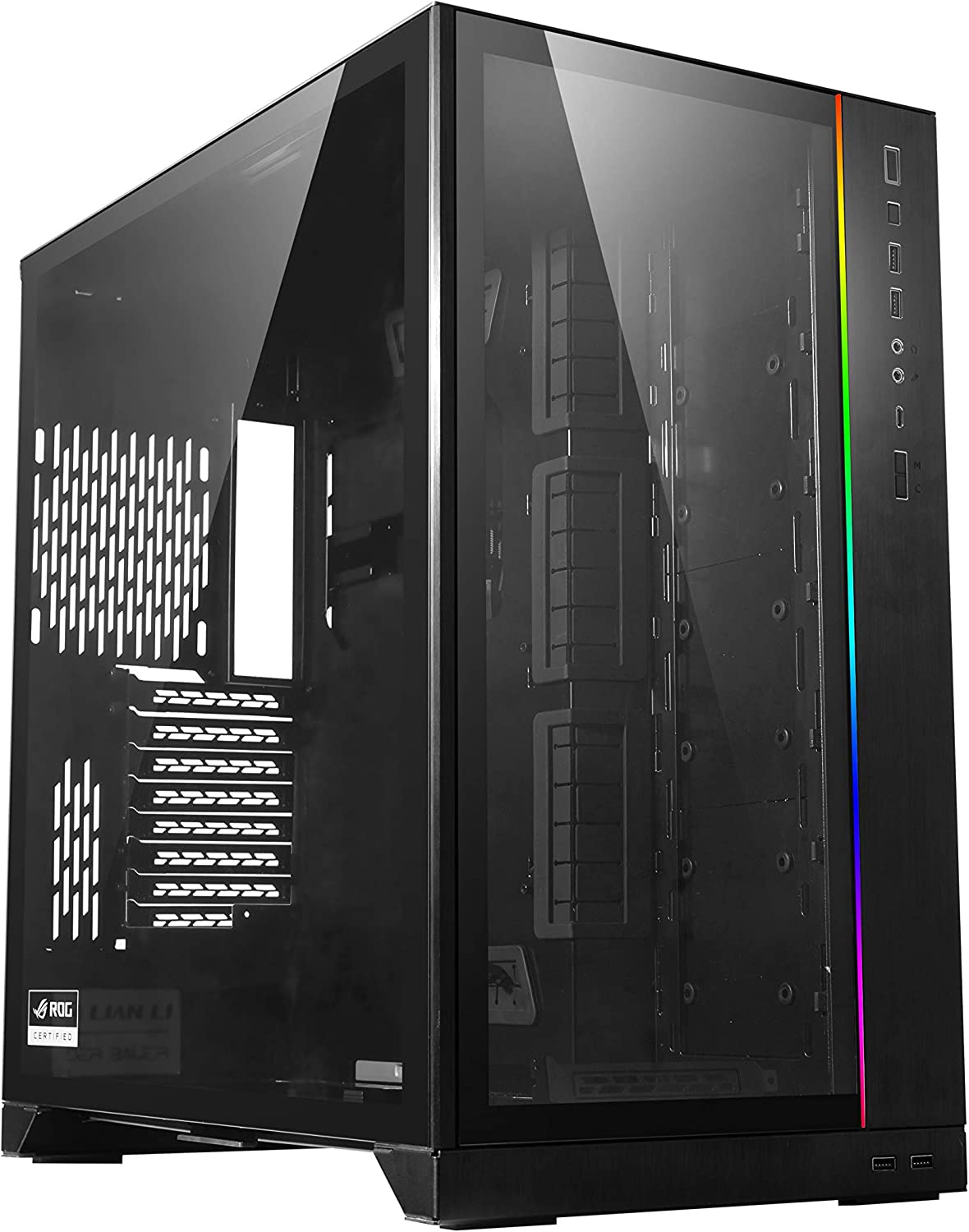
The Lian Li O11 Dynamic is distinguished from the other products on the market by the use of seamless tempered glass for both the front and sides of the device. As a result of the O11 Dynamic not having a necessity for airflow from the front, this style is perfect for it. In terms of airflow, this enclosure supports a broad range of different fan configurations and directions, which allows it to satisfy the cooling requirements of even the most powerful components.
In this scenario, there are two key locations where intake fans might be put to beneficial use. The O11 Dynamic XL features slots on the bottom and the right side of the motherboard tray for the installation of cooling fans. Attaching the water-cooling radiators, each of which is capable of simultaneously supporting up to three 120mm fans, can also be done in these places if desired.
Radiators with diameters ranging from 120mm to 360mm may be placed in any one of the three available slots in the housing for these components. A 360mm radiator is more than enough for most general consumers, so we see the radiator support of this case as adequate. Even our selection of the best CPU coolers for i9 13900K tops out at 360mm.
Tubes leading to the heat-generating components can be routed along the length of the computer case from a water cooling distribution block installed to the right of the motherboard tray. This method not only produces an attractive and well-organized water-cooling loop but also aids in enhancing the build’s visual appeal.
You won’t be let down if you go with the Lian Li O11 Dynamic XL as your water-cooling solution of choice.
2. Corsair Obsidian 1000D
Best Premium Water Cooling Case
Pros
- Supports Dual Systems
- Attractive Modern Design
- Loads of Features
- Luxurious Build Quality
Cons
- Very Expensive
Form Factor: Super Tower | Dimensions: 693 x 307 x 697 mm | Radiator Support: 120mm, 140mm, 240mm, 280mm, 360mm, 420mm, 480mm | Front Panel: 4x USB 3.0, 2x USB 3.1 type-C, 1x HD audio | Motherboard Support: E-ATX, ATX, Micro-ATX, mini-ITX
Corsair’s flagship case, the Obsidian 1000D, offers excellent build quality combined with a wealth of features and is known as the company’s “showpiece.” It is possible to use it with an E-ATX-based system and a mini-ITX-based system simultaneously, which is equivalent to using two whole PCs inside a single chassis. This characteristic conveys the enormous proportions of the case.
You can also explore our selection of the best dual PC cases for more options in that category.
The dimensions of the case are 27.4″ by 12.1″ by 27.4″ which translates to 693 x 307 x 697 mm respectively. The brushed metal used in the construction of the case’s primary framework lends it a sophisticated appearance. Additionally, the front, sides, and top of the enclosure are covered in tempered smoke glass. Moreover, it has the potential to be one of the best airflow cases that we have come across in the full tower category.
It is one of the heaviest computer cases due to the case’s weight of 65 pounds, which is quite a startling number in the PC case market and places it among the heaviest computer cases. Large dust filters are placed on the front, top, rear, and bottom of the case to filter out the incoming air.
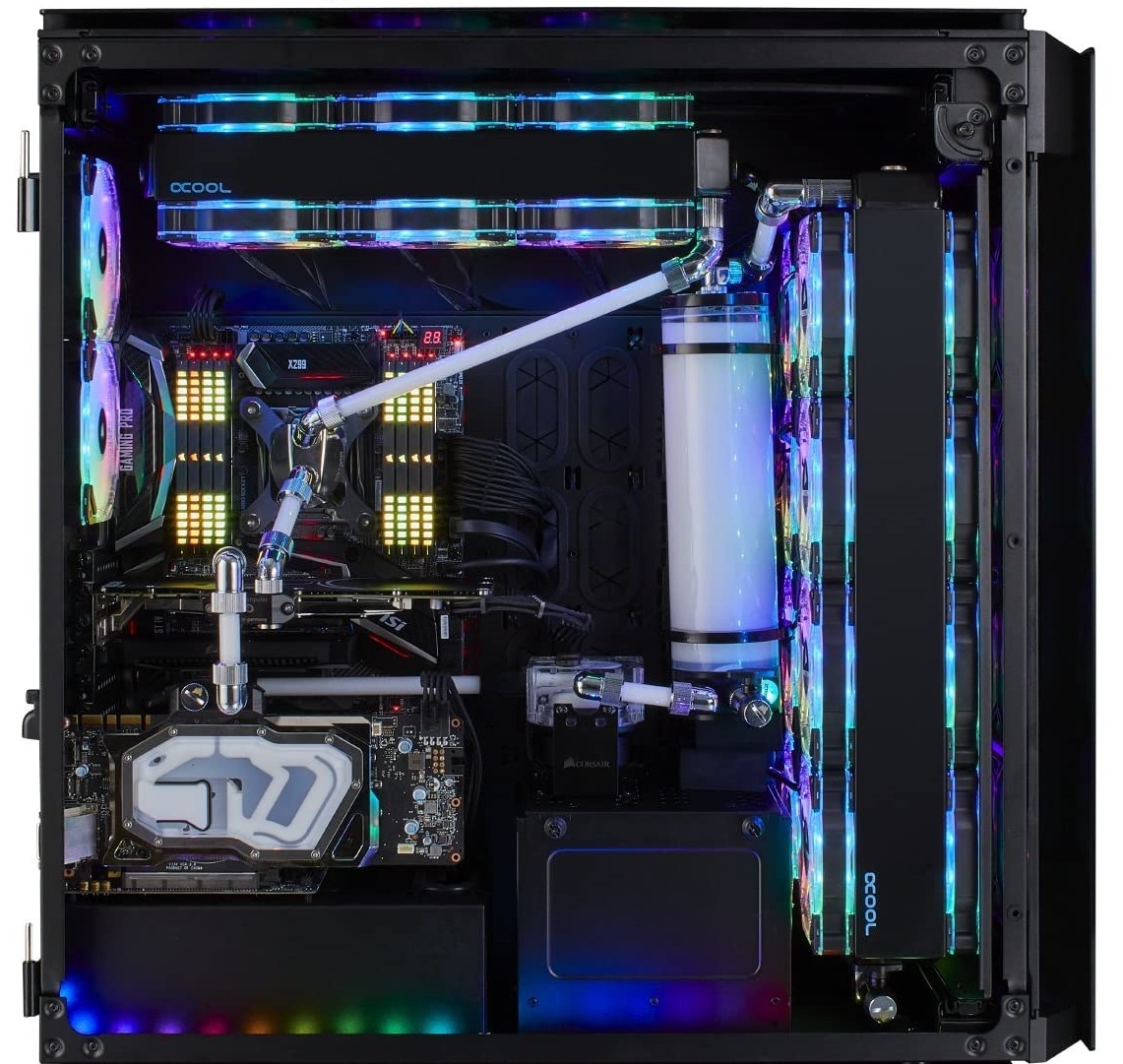
The case also contains two trays measuring 480 millimeters (front), two trays measuring 480 millimeters (top), and two trays measuring 120 millimeters (back), as well as the vents for the power supply unit. The front panel of the casing has 3.5mm jacks for speakers and microphones, as well as two USB 3.1 Type-C ports, four USB 3.0 ports, a power button, and a reset button.
The case also comes with an integrated fan and lighting controller known as the “Corsair COMMANDER Pro.” This controller allows for the operation of up to 6 PWM fans, 2 RGB Strip Controls, and 4 temperature controls. You can configure the Commander Pro controller using the Corsair iCUE RGB software. There is no question that the Commander Pro is among the very best RGB controllers currently available on the market.
It is also essential to note that the stock model of this case does not come with any fans or a radiator tray. This omission will lead to an increase in costs because the majority of cases currently available on the market are already equipped with certain fan configurations. The case does have a lot of cable management room, and all of the cable management is done on the rear of the space where the motherboard is mounted.
Corsair provides a two-year warranty on the case, which is more than sufficient for a PC case’s safety needs. It is the best premium water cooling case that we have on our list, but it is solely intended for serious enthusiasts who aren’t concerned about the cost and want just the very best.
3. Thermaltake Tower 900
Best Showcase Water Cooling Case
Pros
- Unique Shape
- Ideal for Showcase Builds
- Can Support 560mm Radiators
- Tempered Glass on 3 Sides
Cons
- Unusually Expensive
Form Factor: Super Tower | Dimensions: 752 x 423 x 483mm | Radiator Support: 480, 560mm | Front Panel: 4x USB 3.0, 1x HD Audio | Motherboard Support: E-ATX, ATX, Micro-ATX, mini-ITX
If you have room on your desk for a computer chassis that is bigger than a full tower, then you might be inclined to buy one of the various super-tower cases. These cases often have the largest and most roomy interiors available for custom water cooling, and they are constructed with the explicit purpose of providing space for bespoke water cooling systems in mind.
The Thermaltake Tower 900 is one of the most impressive super-towers currently available. It stands out from the majority of other PC cases due to its larger size as well as its distinctive visual expression. The majority of PC cases are in the shape of rectangular boxes with narrow fronts and broad sides. In contrast, the Tower 900 is a boxier chassis that has a wide front and narrow sides, making it the perfect showcase for water cooling.
The Tower 900 has dimensions of 752 millimeters by 423 millimeters by 483 millimeters, and it is compatible with E-ATX, ATX, mini ITX, and micro-ATX motherboards. The tower’s size is not the only aspect of the Tower 900 that could give the impression of being excessive. This computer case weighs around 24.5 kilograms, which is more than twice as heavy as a Lian Li O11 Dynamic XL.
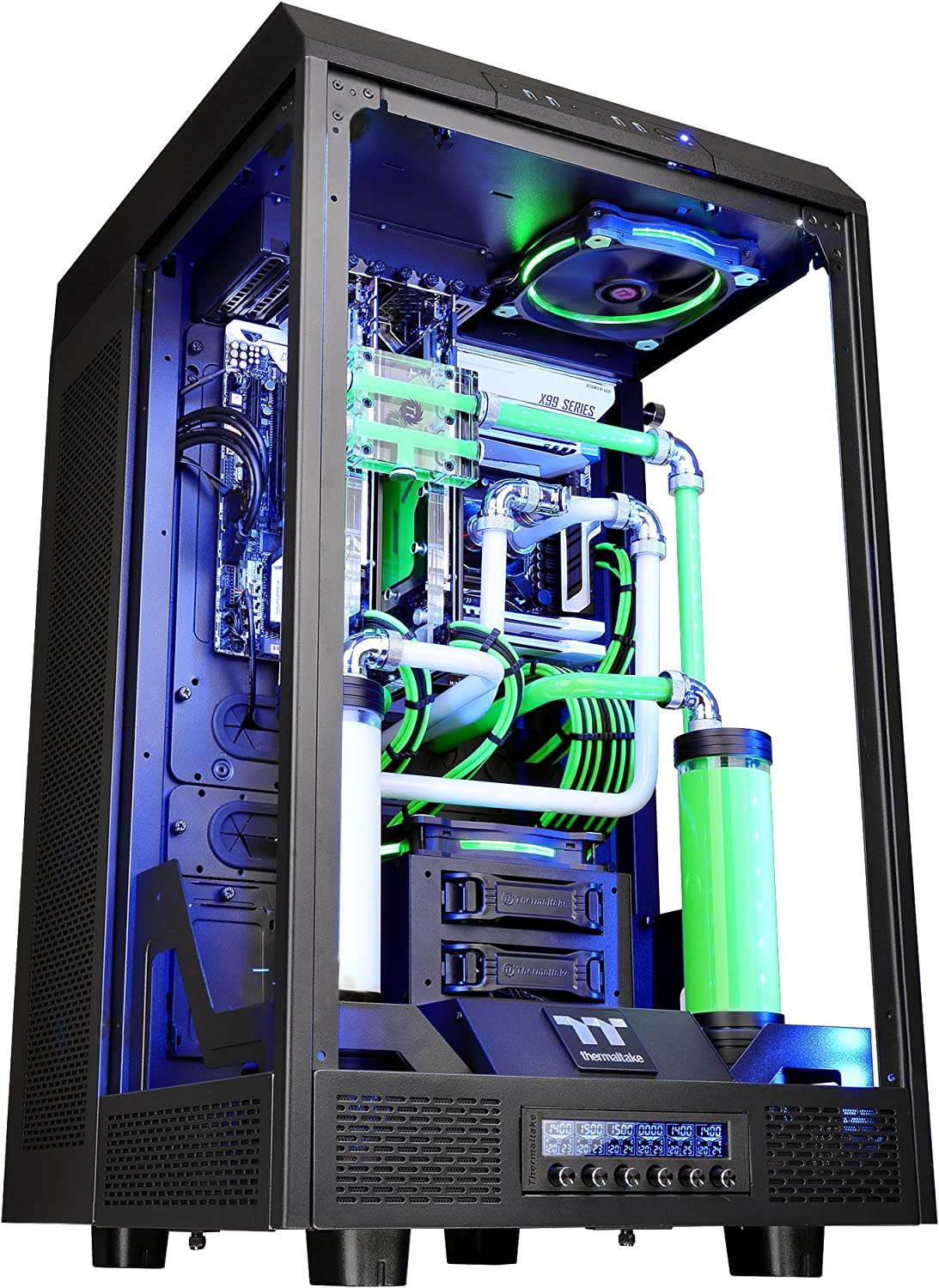
However, the Tower 900 is designed to be large for a specific purpose. It is possible to fit any build conceivable under the sun with this computer case; but, owing to its size and weight, it may be difficult for you to fit this computer case on your desk.
The Tower 900 is fully equipped with a variety of water-cooling features. The radiators that can be supported by this case have a maximum length of 560 millimeters, which is an absolutely enormous radiator size. In addition to this, building a custom loop inside of this case is a pleasure because of its ridiculously huge size and well-thought-out design.
The Tower 900 is also modular, which means that you may modify the components that are housed within the chassis to ensure that it is an exact match for your particular project. There are also controls for RGB lighting included, which is a wonderful addition to the casing.
Be sure to check out our selection of the best high CFM case fans to fill out your Tower 900 build.
If you have no problem with its price and weight, the Tower 900 is a massive computer case that has the potential to be a good display piece. However, it does not come cheap. It is easy to construct within, it is capable of housing enormous radiators that no other standard case is capable of housing, and it has a one-of-a-kind boxy form that can appeal to your sense of style.
However, due to the possibility that the completed system may weigh more than 100 pounds, you will need to be prepared to make a significant financial investment in a specialized water cooling system. Still, it is the best showcase water cooling case in our roundup.
4. Cooler Master Cosmos C700M
Best RGB Water Cooling Case
Pros
- Impressive RGB Implementation
- Tons of Space
- Modern Design Language
- Superb Build Quality
Cons
- Very Heavy
Form Factor: Full-Tower | Dimensions: 639 x 306 x 651 mm | Radiator Support: 120mm, 140mm, 240mm, 280mm, 360mm, 420mm | Front Panel: 4x USB 3.0, 1x USB 3.1 type-C, 1x HD audio | Motherboard Support: E-ATX, ATX, Micro-ATX, mini-ITX
The “Cosmos” series is Cooler Master’s highest-tier product line, and the Cooler Master Cosmos C700M is a star of that line. The framework of the casing is made up of plastic and metal, and it has panels made of curved tempered glass. In addition, there are two RGB strips integrated in the front and top areas of the metal, and there is also ambient RGB lighting on the bottom.
The RGB lighting is very well-implemented and is one of the best PC case lighting solutions we have yet seen.
Mounts for cooling solutions can be found on all four sides of the case: one measuring 420 millimeters on the front, one measuring 420 millimeters on the top, one measuring 140 millimeters on the back, and one measuring 280 millimeters on the bottom. The I/O ports are found on the top front portion of the housing, while the top of the casing features thick metal grips for mobility purposes.
In a related vein, you might also be curious about our recommendations for the open-air computer cases that are now available to purchase in the year 2022.
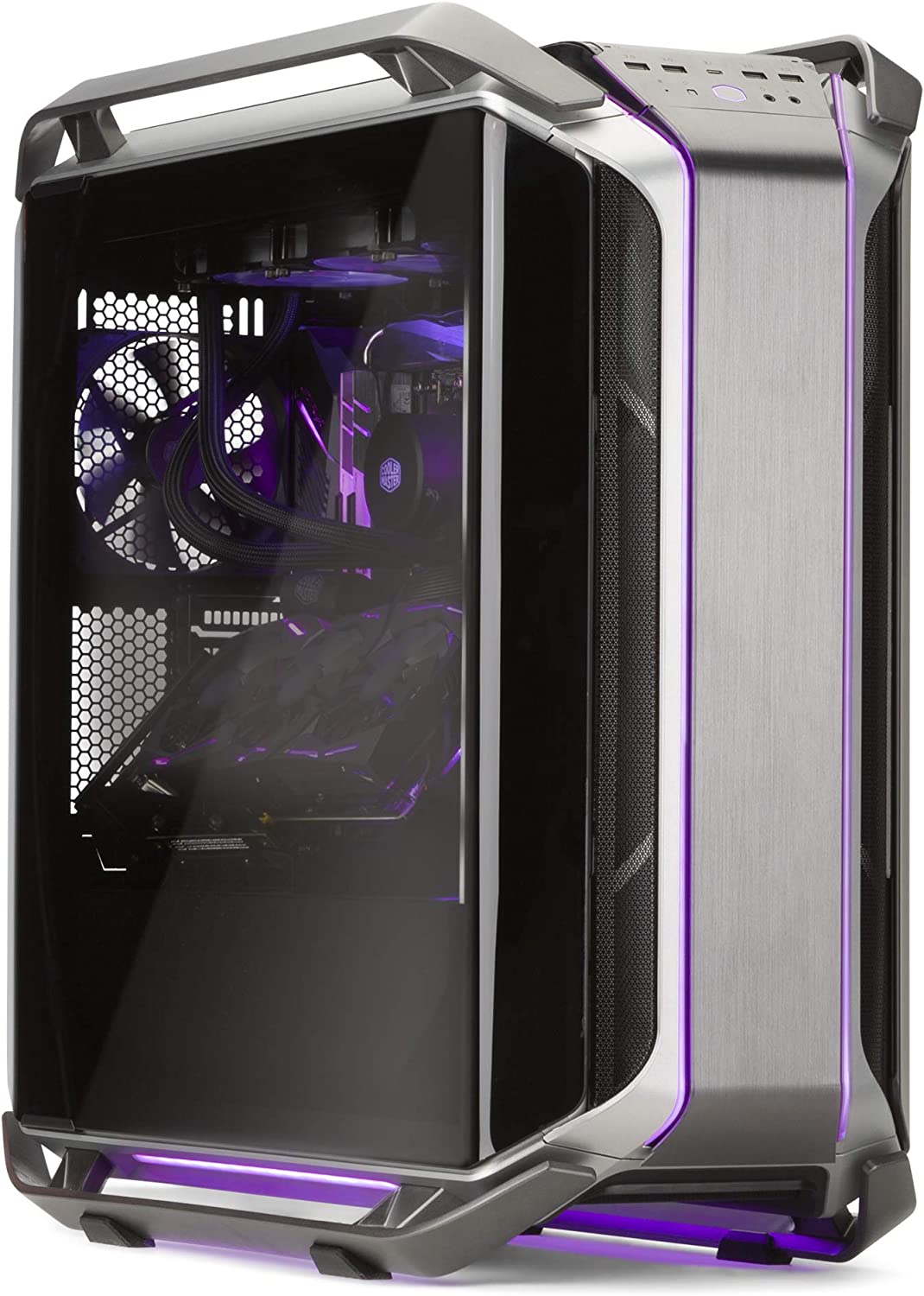
The I/O ports include a power button, as well as 3.5mm jacks for a microphone, speaker, RGB control buttons, and fan speed control buttons. Additionally, there is one USB 3.1 Type-C connector and four USB 3.0 ports.
Internally, the design and layout of the motherboard are one of the standout characteristics of this case. The user has a lot of leeway for customization because of the motherboard’s ability to be utilized in either an inverted configuration or a layout rotated by 90 degrees. This implementation is becoming quite trendy in recent years.
The Cosmos C700M has a stock configuration that weighs around 50 pounds and comes pre-installed with three 140mm fans on the front and one 140mm fan on the rear. These fans are part of the standard package. The chassis has the capacity to support up to ten internal bays, with five measuring 2.5 inches, four measuring 3.5 inches, and one measuring 5.25 inches. Of these, one space is set aside specifically for optical drives, which may be needed occasionally.
In our Cooler Master MB511 RGB Review, we also looked at yet another model of the company’s popular computer cases.
The casing also has a one-of-a-kind design that allows for the vertical and slanted positioning of graphics cards by utilizing a PCI-E riser and the included frame. Cooler Master offers a warranty on the case for a period of two years in the event that any RGB or other electrical component develops a defect during that time.
This PC case offers a reasonable amount of space for custom cooling solutions while yet maintaining a respectable look. It’s possible that this is not the most spacious case available for water cooling, but it is certainly not out of the conversation. Ultimately, our conclusion is that it is the best RGB water cooling case on our list.
5. Thermaltake Core P8
Best Stealthy Water Cooling Case
Pros
- Space for four 480mm Radiators
- Can Support 20 Fans
- Extremely Spacious
Cons
- Very Expensive
- Ridiculously Heavy
Form Factor: Full-Tower | Dimensions: 660 x 260 x 626mm | Radiator Support: 120mm, 140mm, 240mm, 280mm, 360mm, 420mm, 480mm | Front Panel: 1x USB 3.1 (Gen 2) Type-C, 2x USB 3.0, x 2 USB 2.0, 1 x HD Audio | Motherboard Support: E-ATX, ATX, Micro-ATX, mini-ITX
The Thermaltake Core P8 is one of the bolder options in our assortment of computer cases. Aside from custom water cooling, no other kind of cooling will suffice in this circumstance. You need to be committed to bespoke water cooling to purchase a Core P8, however, the upshot is one of the most impressive cases available.
You can also check out our list of the best open-air cases for more options in that category.
The Core P8 is yet another enormous full-tower case; its dimensions are 660 millimeters by 260 millimeters by 626 millimeters, and it weighs more than 22.6 kg. This is almost twice as hefty as the Lian Li O11 Dynamic XL, which is another choice in the full-tower category. Even if the O11 Dynamic offers a few improvements, the Core P8 has specialized water-cooling features that are far more effective.
Thanks to its roomy interior, the P8 can accommodate not just ATX, micro ATX, and mini ITX motherboards, but also the bigger E-ATX form factor. This is possible because of the P8’s generous dimensions.
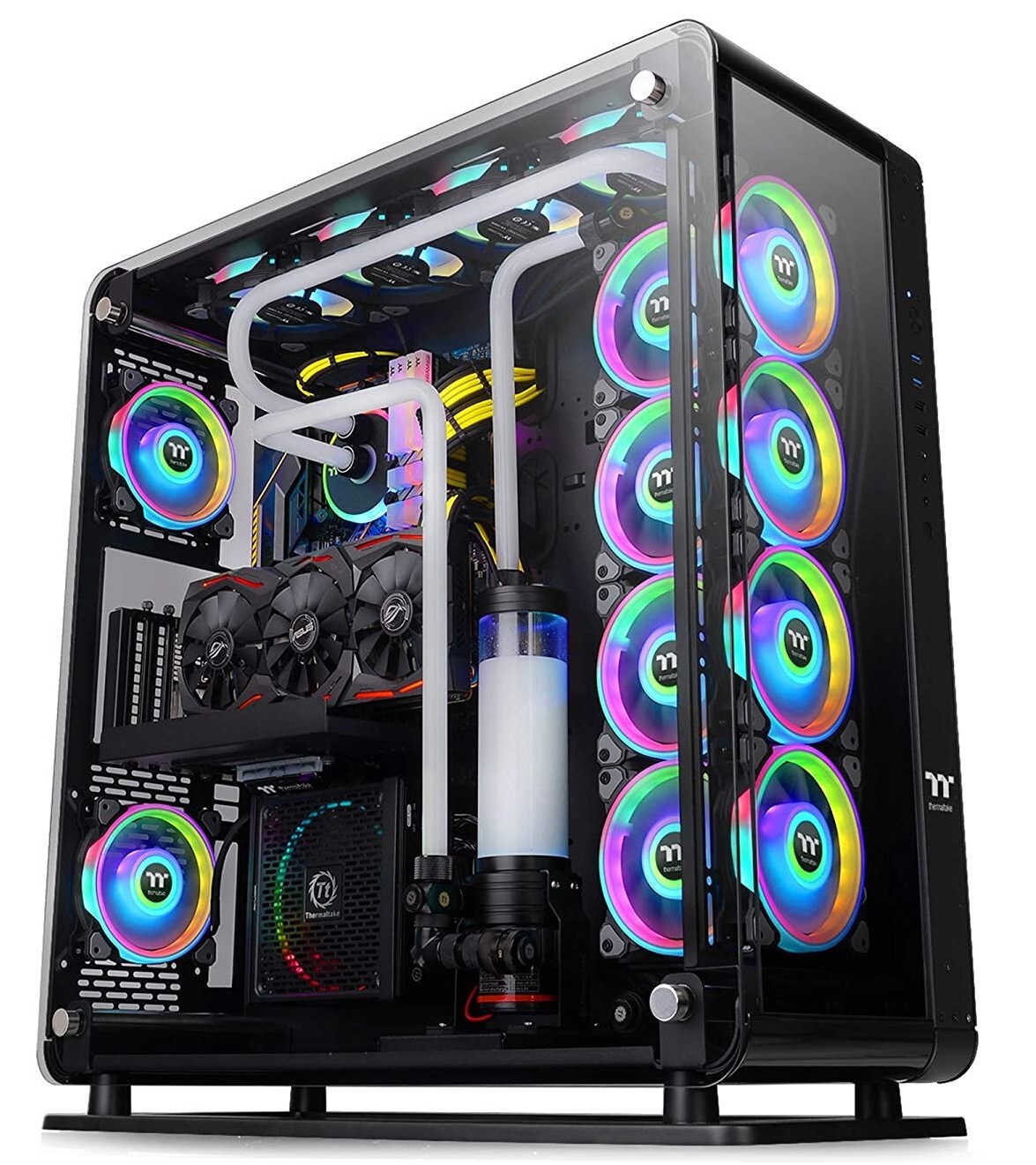
When we take into account the water-cooling features that are accessible, this option becomes more exciting. There are numerous available slots on the Core P8 that can accommodate radiators of a variety of sizes, including 120mm, 140mm, 240mm, 280mm, 360mm, 420mm, and 480mm. As if that weren’t enough, the case comes with a plethora of mounting options that let you install anywhere from one to twenty 120mm case fans or radiators.
Since the front panel and both side panels of this case are composed of tempered glass, your gorgeous water-cooling rig can be admired in all of its glory. The Core P8 is a very appealing case, despite the fact that it is rather large and that there is a broad range of different fan mounts available. There are very few sights in the realm of PC building that can compare to the sight of this computer case when it is completely packed with fans and illuminated with RGB lights.
Furthermore, the Core P8’s internal design is modular, allowing you to swap out individual chassis components to better accommodate your build plan and the unique needs of your custom water cooling system. A water-cooling distribution plate, useful for arranging the loop’s tubing runs, may be installed in the P8 as well.
It is hard to call any water cooling case “stealthy”, but the Thermaltake Core P8 is a good contender for that category. If you do not install fancy RGB fans and lighting in this case, it is the best stealthy water cooling case that we recommend on our list.
As a whole, the Core P8 is one of the best full tower cases for water cooling because it was made for that specific purpose. Although the purchase of this case will involve serious financial and physical effort on the part of the customer, the outcome is certainly worthwhile.
6. Thermaltake Level 20
Best Designed Water Cooling Case
Pros
- Extraordinary Design
- Modular Compartments
- Unlimited Possibilities
Cons
- Ridiculous Price Tag
- Hard to Work In
Form Factor: Super Tower | Dimensions: 688 x 279 x 731 mm | Radiator Support: 120mm, 140mm, 280mm, 360mm, 420mm, 480mm | Front Panel: 4x USB 3.0, 1x USB 3.1 type-C, 1x HD audio | Motherboard Support: E-ATX, ATX, Micro-ATX, mini-ITX
In 2018, Thermaltake launched a new range of PC cases, among which the Thermaltake Level 20 is the flagship offering. This particular case offers an otherworldly design with separate chambers for your different components.
The power supply unit chamber (PSU Chamber), the motherboard chamber (MB Chamber), and the storage and liquid cooling system chamber (LCS Chamber) each have their own dedicated space within this case. These chambers have been thoughtfully crafted with the intention of isolating the component sections in such a manner that the heat may be drained effectively while maintaining the integrity of the individual components.
While the main structure’s edges are made of curved aluminum, each chamber features glass panels made of tempered glass that open in a sideways manner. At a glance, it’s clear that this complete tower case has the most appealing design of any of the options we’ve compiled. You might also think about buying the best RGB fan packs to make this case seem even better with their vibrant lighting.
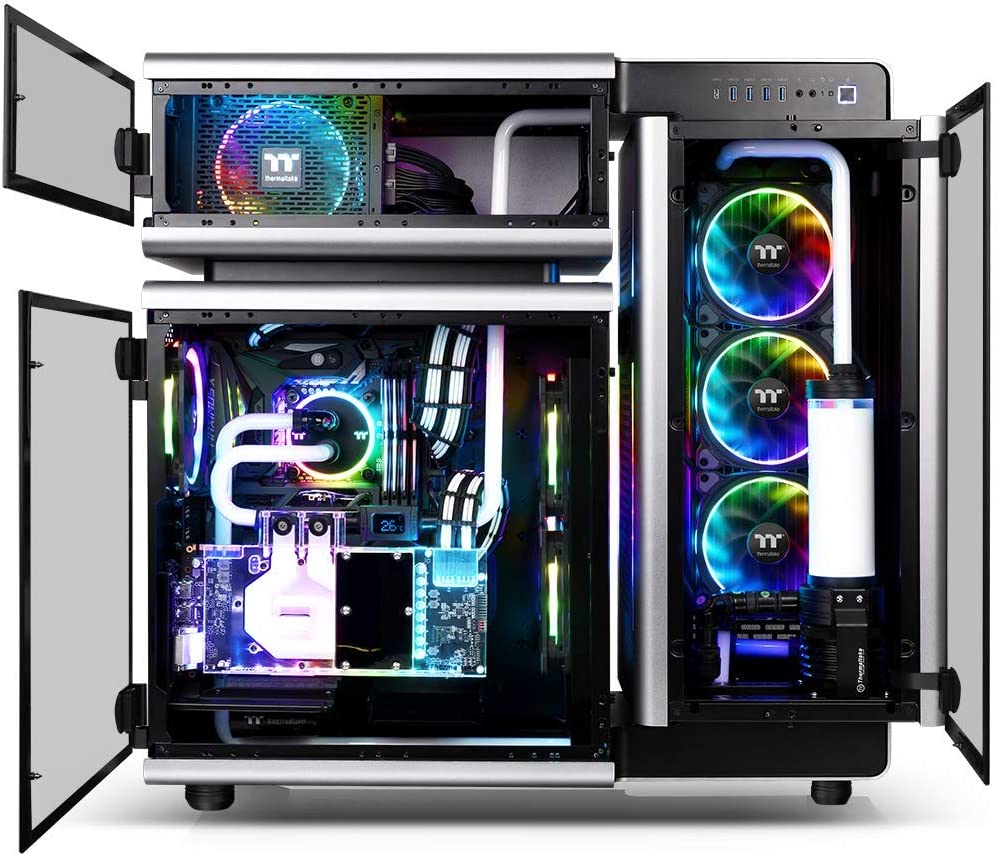
The storage chamber can support up to 420mm radiators with 3 x 120mm or 3 x 140mm fans, and the PSU chamber can host the PSU in either a horizontal or vertical alignment. The motherboard chamber can support up to 360mm radiators, as well as 3 x 120 or 2 x 140 mm fans on the front, and 1 x 120mm or 1 x 140mm fan with/without radiator at the rear.
The front I/O ports include a power button, as well as 3.5mm jacks for both the microphone and the speaker. Additionally, there is one USB 3.1 Type-C port.
Related Read: Soft Tubing vs Hard Tubing
Moreover, the chassis is equipped with a Riing Plus RGB Controller that allows the fans and lighting to be synchronized with other Razor Chroma products. In addition, the controller supports voice recognition, which can be used to configure a variety of lighting schemes or fan speeds when used with devices that are enabled with Amazon Alexa.
Thermaltake has provided a sufficient amount of lighting by including three Riing Plus 14 RGB fans and two Lumi Plus LED strips in this package. There is support for a maximum of eleven internal bays, however, there is no room for a 5.25′′ drive such as an optical drive. In addition to this, the chamber that houses the motherboard has a built-in PCIe riser cable that allows for vertical installation of PCI-E components, notably the graphics card.
Since Thermaltake commemorated the completion of 20 years in the computer industry with the release of this case, the company decided to charge a higher price for it than they would for a standard computer case. This gave the case the appearance of a collectible piece rather than a modern computer enclosure.
As a result, the price is totally outrageous and definitely does not provide a lot of value for money. Still, we have crowned this case as the best designed water cooling case due to its unbelievable design.
7. Phanteks Eclipse P400A
Best Compact Water Cooling Case
Pros
- Compact Option
- Great Airflow
Cons
- Relatively Limited Space
- Loud Front Fans
- Limited Radiator Compatibility
Form Factor: Mid-Tower | Dimensions: 470 x 210 x 465 mm | Radiator Support: 120mm, 140mm, 240mm, 280mm, 360mm | Front Panel: 2x USB 3.0, 1x HD Audio | Motherboard Support: E-ATX, ATX, Micro-ATX, mini-ITX
Phanteks is a brand name that has become practically ubiquitous with devices that are responsible for cooling your PC. The Phanteks P400A is a case that has a straightforward appearance but is in fact quite sophisticated and well-thought-out in its construction. It is possible that this PC case is the best compact water cooling case in our roundup.
Your PC components will fit nicely within the Phanteks P400A, which has an ATX mid-tower form factor. There are three distinct variations of this case available and all three are sold separately: one is black without RGB, another is black with RGB fans, and the third is white with RGB fans. It is clear that the Phanteks P400A is a large case, as evidenced by its dimensions of 470 millimeters by 210 millimeters by 465 millimeters.
A solid metal mesh covers the front of the case, and immediately behind it are three 120mm fans. Controls and buttons, in addition to extra USB ports, are located on the top of the device. This is also where the power button is located. If you have an RGB model, the buttons located at the top of the device allow you to adjust the lighting effects as well as other aspects of the device.
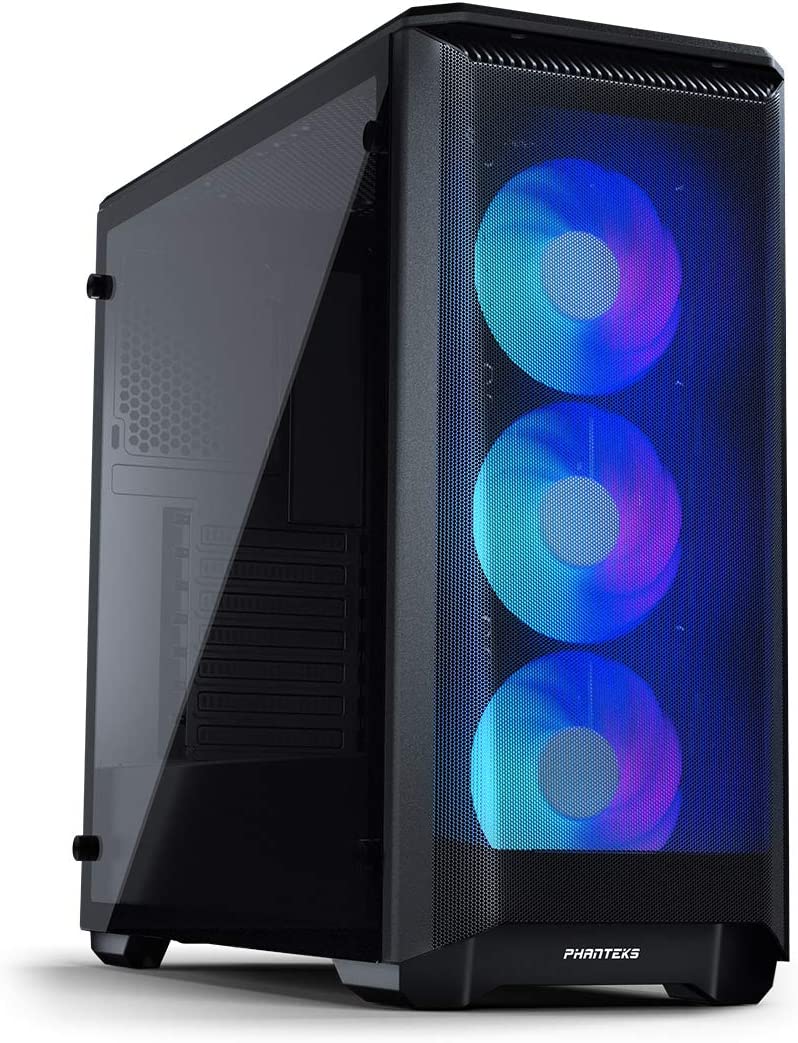
Since there is lots of room within the Phanteks P400A for you to make any upgrades, purchasing this case is like making an investment in the future potential of the case. On the topic of expansion, you are able to install an E-ATX motherboard, and the Phanteks P400A has room for two hard disc drives, two solid-state drives, as well as four optical drives. This case also comes equipped with a bracket and mounts for the GPU and HDD, making it simple to install both of those components.
The mesh on the top panel has a magnetic filter as well, which filters the air that is drawn into the case and collects any dust particles that may be present. The fact that this filter is simple to clean is still another advantage offered by it.
The white version of the Phanteks P400A can also be considered one of the best white PC cases on the market.
There are alternative products available on the market that are comparable in cost to the Phanteks P400A, but none are as optimized for water cooling as this case. Thanks to its spacious interior, this case excels in a diverse range of areas which makes it an outstanding option for a computer case that can be used in multiple projects.
The Phanteks P400A is a terrific PC case to have because it will ensure that your water cooling components have all of the ventilation they require for optimal performance. It comes with a price tag that is fair, and it is definitely an investment that is wise for any future upgrades that you might want for your PC.
How we picked and tested
Picking the ideal PC case is already a complex task even before you add water cooling into the mix. Even the tiniest miscalculation can lead to compatibility issues and you may even need to reconstruct the entire build in a different case.
This is why we laid down stringent criteria when selecting the cases for this roundup.
Our primary focus was on the size of the PC cases we selected. Custom loop water cooling requires a lot of space, and it can even be helpful to have additional room to expand further down the line. This is why we selected large full-tower and super-tower cases in our roundup.
Secondly, we selected the cases that offered the best compatibility for water cooling components on the market. This includes space for reservoirs, custom tubing, large radiators, multiple fans, and other accessories. Any bonus water cooling features offered by cases were also considered in the final ranking.
Moreover, the aesthetics of the cases were also a major point of focus during the selection process of the different cases on this list. Custom loop water cooling can elevate the looks of your build to another level, and the case plays a huge part in that. Therefore, the design and lighting features of the cases were carefully considered.
We also laid a focus on the miscellaneous quality-of-life factors that can make or break a case. For example, the weight and build quality of a case are some of the factors we evaluated closely in this process.
Of course, we also considered the price and value proposition of the various cases that were shortlisted. While most water cooling cases are generally expensive, we prioritized cases that offered a better bang for the buck when it comes to water cooling features and compatibility.
In the testing process, our team of specialized hardware experts left no stone unturned. We carefully evaluated each selected case by running them through a gauntlet of tests specifically designed to test airflow and thermal performance.
Water cooling is directly dependent on the airflow of the case as the air is used to cool down the radiators, which is why thermal testing is crucial in this regard. The empirical and objective data obtained from these tests helped us greatly in the creation of this roundup.
This gave the editorial team a great idea of the quality of the different cases and the thermal performance that can be expected from them.
Combining the testing data with the objective analysis of the cases’ features and prices, we have curated a selection of the best water cooling cases you can buy for your next build.
AiO Liquid Coolers vs. Custom Loop
When deciding between an AiO liquid cooler vs. custom liquid cooling loop, you may be considering which option offers the greater value. The operation of both of these liquid-based cooling methods is similar but has some fundamental differences as well.
It should be made clear that AIO liquid cooling and custom loops are both viable methods of cooling, with many factors tipping the scales in favor of the custom loop and many others suggesting that AIO liquid cooling is superior.
From a true enthusiast’s point of view, a bespoke loop liquid cooling system is far superior to an all-in-one (AIO) liquid cooling solution. With a personalized loop, you can enhance both performance and aesthetics.
Subsequently, if you have an enthusiast-level motherboard with built-in VRM water cooling, you may benefit from a custom water cooling solution even more. The custom loop can be inserted into the pre-installed water-cooling heatsink to achieve better temperatures of the VRM. This can improve the performance and stability of the VRM in the long term.
One also has to take into account the advantage of custom liquid cooling loops in terms of aesthetics. You can design an extraordinary PC build with the use of appropriate hardline tubing, beautiful water blocks, and unique coolant. Using a custom loop can really elevate the looks of your PC build.
This is not to say that the AiO liquid coolers are not viable options, though. Since the temperature gain is not actually proportional to the higher cost, you should definitely stick with AiO coolers if you do not have an infinite budget for your build. All-in-one liquid coolers hold a massive advantage over custom loops since the latter is so much more expensive by comparison.
Also, ordinary AiO coolers are better suited for use in a regular PC build since custom liquid cooling loops require constant attention and maintenance. Consider these factors when you weigh the benefits of upgrading to custom loop liquid cooling against conventional closed-loop cooling for your next build.
How to Optimize your Airflow
When building your own PC, one of the most important things you should do is work on improving the circulation of air within the computer’s chassis. This approach should not just be tried by enthusiasts, but also by regular users on a more casual basis. This can keep the components of your computer from overheating, prevent the chassis from suffering exponential dust buildup, and, in general, improve the components’ expected lifespan.
In the first step, we are going to work on building up positive pressure inside the chassis. When we talk about positive airflow, what we mean is that the fans located inside of your system are taking in more fresh air than they are pushing out of the system in the form of hot air. Due to this, a positive cooling cycle is produced, which is exactly what you want to achieve.
When there is more air being flushed out than there is being drawn in, negative air pressure develops. This creates a potential vacuum that may start sucking air from cracks and crevices in the chassis, which results in an enormous amount of dust accumulation. The intake and expulsion cycles are balanced in a system with equal air pressure.
Moreover, placing the system in a cooler environment will allow for cooler air to be pulled in, which will reduce the temperatures of both your CPU and your graphics card (GPU). Fans, which are the primary operators in this entire cycle, have the potential to be the ultimate game-changers in successfully circulating the air depending on their size, speed, alignment, and type.
Radiators, if placed appropriately, may function as effective exhausts. In addition to ensuring that your system cools properly and that its circulation is not disrupted by unwanted foreign bodies, keeping your system clean on a regular basis and taking preventative efforts to keep dust and other particles that might cause blockages out of your setup are two of the most important things you can do.
Last but not least, if your chassis is still becoming too hot, you should consider looking at our recommendations for the best airflow PC case alternatives currently available and replacing it if necessary. It’s possible that our in-depth PC case buying guide will come in handy here.
Buyer’s Guide
Water cooling can be a tricky process, especially due to the various compatibility issues that can arise thanks to its bespoke nature. On the flip side, it is one of the most interesting and fascinating features you can implement in your custom rig.
Therefore, it is more than crucial that you buy one of the best water cooling cases if you want your build to go smoothly. Keep in mind the following factors when shopping for your PC case.
Size
In cases that are designated for water cooling, space is of the utmost significance. The cooling system will consist of components such as the pump and the reservoir in addition to a number of radiators of varying sizes. These components have to be kept at a safe distance from the motherboard and given adequate room to breathe.
Even if you are able to store all of your components inside the case, the case itself must be able to ensure that all of the components are kept at temperatures that are optimal for them or as cool as possible. This may be difficult to accomplish with cases that are small in size, but it becomes easier as the size of the case increases.
Due to this, full tower cases are a substantially superior option for water cooling. You can also get away with water cooling in a mid-tower chassis, whereas mini ITX models are not recommended for this application. The space will also be essential since it will enable you to set up your cooling loops as well as any accessories that are necessary to cool specific components.
Compatibility
When considering which PC case to purchase, compatibility should be at the top of your list of priorities because it is the single most crucial aspect of buying a water cooling PC case. Even though the vast majority of computer cases offer at least some level of support for water cooling, you still need to make sure that they are compatible with your selected components.
Particularly, be sure to check that your selected case can support your motherboard and offers a sufficient amount of clearance for the various components of your computer, such as the power supply and the graphics cards. The case should have sufficient size to house all of your water cooling parts, provide the space to organize all of the cables, and be generally efficient in its airflow configuration.
Moreover, in-built water reservoirs and reservoir mounts are also wonderful complements to any PC case, but they are not necessary. Your primary focus should be on compatibility with the radiator sizes that you plan to use, as well as the fans and reservoirs that go along with them.
Cross-checking the compatibility of your components with your case will save you a ton of hassle down the line.
Airflow
A decent PC case can be identified as one that has adequate airflow relative to the size and number of the components it will house. Along with that, it is a good idea to have a case that is large enough so that you will have room for upgrades in the future without having to modify anything else about the system. There are several reasons why merely installing additional fans cannot always be the solution.
As a result, your first option should be to select a case that has been constructed in such a manner that it not only provides sufficient room for optimum airflow but also is intended to improve upon that.
You have a wide variety of options available to you due to the abundance of PC cases now on the market, which range from some executions that are too enthusiastic to others that are straightforward but extremely effective. By keeping system temperatures and dust accumulation to a minimum, which further ensures the lifespan of concerned components, adequate airflow may be achieved.
Be sure to look for mesh panels and dust filtration when selecting your desired case. Even if you plan on water cooling, airflow is crucial since it is required to cool down your radiators as well as the graphics card and other components. Maintaining the ideal airflow conditions in your case is easy to do with the aid of our comprehensive guide that explains how to optimize your airflow.
Design and Aesthetics
The design and overall look of the case itself lead us to our final point. If you are a PC owner and you want to show off your rig in all its glory, then the aesthetics matter a lot. From the perspective of functionality, it is not at all significant; however, there is a certain confidence and sense of pride that comes with a well-designed PC.
This particular realm also comes with a lot of diverse viewpoints, so even if there is a case that you really appreciate, there is still a good probability that there is someone else there who does not actually appreciate it. It all comes down to personal opinion, so it doesn’t matter if you prefer stealthy black cases to those that stand out with their RGB lighting in a white chassis.
The layout of the PC case has an effect not only on its dimensions but also on the number of cables and components that may be housed within it. Therefore, it can still be functional in some specific scenarios. Nevertheless, it is important to consider the design and aesthetics of your PC case before you finalize your purchase decision.
Best Water Cooling Cases - FAQs
The difference between a full tower and a mid-tower case is that a full tower is much larger in size and heavier in weight than a mid-tower case. Generally, full towers measure roughly 550 – 750mm tall and 220 – 320mm wide. However, it can vary depending on the manufacturer.
Water cooling can be considered better than air cooling in terms of pure thermal performance. AiO water coolers also have the benefit in the department of aesthetics, but they are more expensive than comparable air coolers. Air cooling offers better value for money and also does not have the risk of leakage.
Custom liquid cooling does require a bit of maintenance. Nowadays, there are many products available on the market that decrease the likelihood of contamination in the loop. However, personal care and attention have no substitute and even a perfectly prepared liquid cooling loop would require a bit of maintenance from time to time.
You can use any case for custom water cooling as long as it has enough space to physically hold all your components. You should also make sure that the case you select has mounting points for your radiator of choice. Moreover, it is wise to select a case that has good airflow for better performance.
A custom liquid cooling loop is worth it if you want to improve the temperatures of your CPU drastically while also improving the overall aesthetic of your PC. However, if you are looking for the best price-to-performance ratio, then you might be better off with a standard AiO cooler.
 Check Price
Check Price